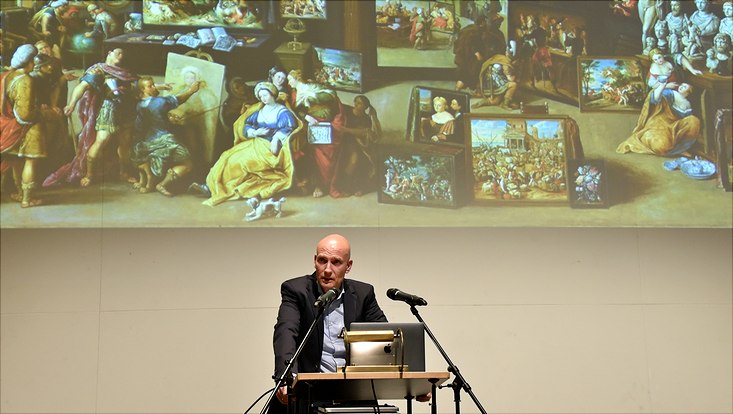Prof. Dr. Thomas Hensel

Photo: Harald Koch / Hochschule Pforzheim
Curriulum
Prof. Dr. Thomas Hensel studied Philosophy, Art History, Classical Archaeology and Corporate Management in Hamburg, Munich and Vallendar. He was a fellow of the Hansische Universitätsstiftung and the Deutsche Forschungsgemeinschaft as well as a fellow of the Kolleg-Forschungsgruppen „Bildakt und Verkörperung“ (Humboldt-Universität zu Berlin), „BildEvidenz. Geschichte und Ästhetik“ (Freie Universität Berlin) and „Cinepoetics – Poetologien audiovisueller Bilder“ (Freie Universität Berlin). In 2012, he was awarded the Aby M. Warburg-Förderpreis des Senats der Freien und Hansestadt Hamburg. Since 2013, he has held the Chair of Art and Design Theory at the School of Design at Pforzheim University. In this role, he is currently leading a BMBF-funded research project on the historical teaching materials collection of the Kunstgewerbeschule Pforzheim (https://designpf.hs-pforzheim.de/kupfer) together with Prof. Dr Evelyn Echle. He was also a member of the faculty at Donau-Universität Krems from 2011 to 2024 and has been co-director of the Institute for Human Engineering & Empathic Design Pforzheim (HEED) since 2016 (https://www.hs-pforzheim.de/forschung/institute/heed) and exhibition curator (e. g. at the ZKM, Bauhaus Dessau, Museum Ulm and Neues Museum Nürnberg). His research interests include the history of media and science of art history (especially Aby Warburg), early German painting/drawing (in particular Albrecht Dürer and the Danube School), design history and theory (in particular Bauhaus and Hochschule für Gestaltung Ulm), as well as game studies (with a particular focus on the iconicity of video games).
Publications (selection)
- Der Ulmer Hocker. Idee – Ikone – Idol, Stuttgart: av edition, 2023 (with Viktoria Lea Heinrich and Martin Mäntele).
- Obumbro. SchattenKunst ComputerSpiel, German/English., Ulm: Museum Ulm, 2019.
- BAU [ SPIEL ] HAUS. 4-volume publication on the exhibition of the same name at the Neues Museum - Staatliches Museum für Kunst und Design Nürnberg, consisting of catalog, reader, artist's book (Olaf Nicolai) and bag (Liam Gillick), German/English, Wien: Verlag für moderne Kunst, 2019 (ed., with Robert Eikmeyer and Eva Kraus).
- Game Studies, Wiesbaden: Springer VS, 2018 (ed., with Benjamin Beil and Andreas Rauscher).
- Wie aus der Kunstgeschichte eine Bildwissenschaft wurde. Aby Warburgs Graphien, Berlin: Akademie, 2011
Research project: „How to Equip Power Skeleton“. Reflections on Game Mechanics of the Video Game
In the course of the fellowship, the writing of a monograph will be completed, that is dedicated to the iconicity of video games and thus seeks to make a significant contribution to understanding one of the most popular and influential artefacts of our everyday culture („Das Spielen des Bildes. Zur Ikonizität des Computerspiels“). The core of the book consists of case studies that explore various forms of iconicity as a constitutive element of video games by analyzing culturally significant manifestations of reflexive or remediating pictures in prominent commercial games across various genres. These manifestations include the still life and the cabinet of curiosities as well as the diorama and the tabula rasa; the genres range from puzzle games and horror survival games to action-adventures and first-person shooters. These analyses are framed by chapters that theoretically underpin these dispositifs and discourses and also raise the question of whether video games can be considered a „tenth art“. Against this backdrop, the research project specifically focuses on the development and formulation of a chapter dealing with the game "Death Stranding" (2019/21). Essential for this game is an unprecedented game mechanic that, in manifold ways – both physically and symbolically – represents and performs balance of power.
